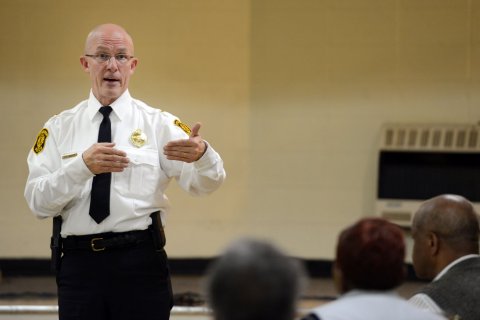
Acting Pittsburgh police Chief Cameron McLay answers questions from community members Monday evening at the Bethel AME Church in the Hill District.
The best law enforcement happens when citizens and the police work together to reduce crime, fear and disorder, the acting Pittsburgh Bureau of Police chief, Cameron McLay, told a group of Hill District residents at a community meeting Monday.
To achieve that goal, he said, members of the public should try to be approachable to officers, and officers should view themselves as public servants first and law enforcement officers second.
Most of all, police and members of the public need to talk to each other, he told the group of several dozen community members inside the Bethel AME Church on Webster Avenue in the Hill District.
"There needs to be more open conversations where police and community members come to the table as human beings and get to know each other as human beings, as somebody they can talk to, and somebody they know by name," said Chief McLay, who became acting chief in September.
The meeting, one of a series in which the police chief and other top brass meet with community members around the city, also allowed citizens to ask the chief anonymous questions written on index cards.
The next such meeting will be held at the Pentecostal Temple on East Liberty Boulevard in East Liberty from 6:30 to 8 p.m. Nov. 17.
The incidents of alleged police brutality and other misconduct that have tarnished the department's reputation for some people are not the chief's responsibility, and it's time for a fresh start, Brandi Fisher, president of the Alliance for Police Accountability, told the audience.
"Chief McLay has not been here for all the incidents that have occurred, so he should not have to answer for or to them," she said.
At Monday night's meeting, one questioner wanted to know how the force could get more officers to walk their beats instead of driving. To do that, Chief McLay said, the force needs more officers or current officers need more time when they are not answering 911 calls or processing paperwork. By shifting officers' duties, he said, his administration so far has freed 10 officers -- two in each zone -- to walk their beats.
How will he prevent racial profiling by officers?, another Hill District resident asked. The short answer, the chief said, is more training. Everyone has unconscious bias that shapes how he or she views the world, and judges the motives and the trustworthiness of people. When officers are on patrol, Chief McLay said, they need to be aware of their implicit bias, and ask whether that bias, or the suspect's behavior, is raising their suspicions.
How can the community help police?, another member of the audience asked.
"Be approachable, say 'hi' to us even when we look grumpy and look like we're having a bad day," Chief McLay said. "Officers are people, too; officers have feelings, too."
Another member of the audience asked how the force can increase the number of black officers in its ranks and in command. That process begins with improving the black community's perception of Pittsburgh police, but diversity is definitely an area that needs improvement, the chief said.
"We were sued a few years ago for not having enough racial diversity, and our racial diversity has gotten worse since then," Chief McLay said. "That's not good -- that's not acceptable."
Amy McConnell Schaarsmith: aschaarsmith [at] post-gazette.com
For more detasils go to: http://www.post-gazette.com/local/city/2014/11/11/Acting-police-chief-ta...